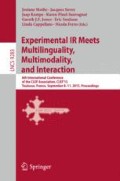Abstract
A set of standard answers facilitates answering emails at customer care centers. Matching the text of user emails to the standard answers may not be productive because they do not necessarily have the same wording. Therefore we examine archived email-answer pairs and establish query-answer term co-occurrences. When a new user email arrives, we replace query words with most co-occurring answer words and obtain a “shadow answer”, which is a new query to retrieve standard answers. As a measure of term co-occurrence strength we test raw term co-occurrences and Pointwise Mutual Information.
Access this chapter
Tax calculation will be finalised at checkout
Purchases are for personal use only
Preview
Unable to display preview. Download preview PDF.
References
Sneiders, E.: Automated email answering by text pattern matching. In: Loftsson, H., Rögnvaldsson, E., Helgadóttir, S. (eds.) IceTAL 2010. LNCS, vol. 6233, pp. 381–392. Springer, Heidelberg (2010)
Lapalme, G., Kosseim, L.: Mercure: Towards an automatic e-mail follow-up system. IEEE Computational Intelligence Bulletin 2(1), 14–18 (2003). IEEE
Itakura, K., Kenmotsu, M., Oka, H., Akiyoshi, M.: An identification method of inquiry e-mails to the matching FAQ for automatic question answering. In: Distributed Computing and Artificial Intelligence, pp. 213–219. Springer, Heidelberg (2010)
Marom, Y., Zukerman, I.: Towards a framework for collating help-desk responses from multiple documents. In: Proceedings of the IJCAI05 Workshop on Knowledge and Reasoning for Answering Questions, pp. 32–39 (2005)
Malik, R., Subramaniam, L.V., Kaushik, S.: Automatically selecting answer templates to respond to customer emails. In: IJCAI, vol. 7, pp. 1659–1664 (2007)
Lamontagne, L., Langlais, P., Lapalme, G.: Using statistical word associations for the retrieval of strongly-textual cases. In: FLAIRS Conference, pp. 124–128 (2003)
Yang, Y., Pedersen, J.O.: A comparative study on feature selection in text categorization. In: ICML, vol. 97, pp. 412–420 (1997)
Author information
Authors and Affiliations
Corresponding author
Editor information
Editors and Affiliations
Rights and permissions
Copyright information
© 2015 Springer International Publishing Switzerland
About this paper
Cite this paper
Alfalahi, A., Eriksson, G., Sneiders, E. (2015). Shadow Answers as an Intermediary in Email Answer Retrieval. In: Mothe, J., et al. Experimental IR Meets Multilinguality, Multimodality, and Interaction. CLEF 2015. Lecture Notes in Computer Science(), vol 9283. Springer, Cham. https://doi.org/10.1007/978-3-319-24027-5_18
Download citation
DOI: https://doi.org/10.1007/978-3-319-24027-5_18
Published:
Publisher Name: Springer, Cham
Print ISBN: 978-3-319-24026-8
Online ISBN: 978-3-319-24027-5
eBook Packages: Computer ScienceComputer Science (R0)

